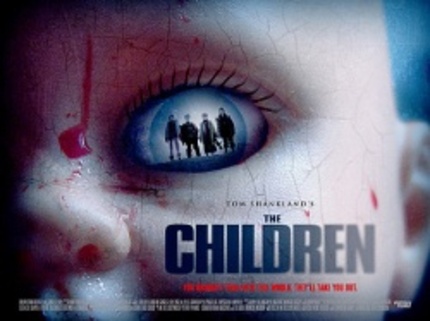Fantastic Fest 09: THE CHILDREN Review


[This review originally appeared when the film screened at Toronto After Dark and reappears now with itès arrival at Fantastic Fest.]
Ah, children. They're sweetness and light and all the good things about life. Too bad they can also be heartless, amoral bastards with no sense of consequence or finality who are willing to do just about anything when it suits them. These things are both true. Guess which side of the coin the titular characters of Tom Shankland's The Children fall on? Without doubt one of the big buzz titles on the genre circuit over the past year thanks to its combination of technical chops and gratuitous violence, Shankland's film made its first Toronto appearance yesterday, playing to a large and rowdy house at the Toronto After Dark festival.
It's a scene anyone blessed (?) with a large number of cousins will find familiar: The dreaded family holiday. Christmas has come and everyone must get together, too many children packed in to too small a space and loaded up with far too much sugar to bounce off the walls for a while before, inevitably, it ends with someone - often several someones - puking on the floor and crying in the corner. It's a familiar scenario and one that writer-director Shankland has clearly lived through more than once because he captures it spot on.
The hosts are Robbie and Chloe, owners of a large country home and parents of two children - Nicky and Leah. Obviously wealthy they are, nonetheless, ideal parents. They homeschool and lavish attention on their children, treating them with respect and love and a firm but fair hand. Significantly less ideal are Chloe's sister Elaine and her husband Jonah, visiting for the holidays with their family of three children. Elaine's eldest daughter - the teenaged Casey - was clearly a mistake and knows it, openly referring to herself as 'the abortion that got away', while youngest son Pauly is a social recluse and middle daughter Miranda is obviously favored by her father. But things seem to be going well ... well, at least, until Pauly develops a strange illness and the children turn hostile.
Expertly paced and staged to maximize tension, Shankland spends just enough time letting you get to know the members and dynamics of the family - all of them beautifully performed - before turning things ugly. These young children, no matter how different they may appear on the surface are corrupt and evil down below. They take pleasure in hurting things. They are fascinated by death. And once they get a taste they prove to be remarkably quick studies, and the blood begins to flow. It's a scenario that if handled poorly could amount to nothing but cheap exploitation but Shankland recognizes one very simple fact: Real children are actually like this, though to a lesser extent. Who hasn't burned a bug with a magnifying glass just because they can? And you really don't want to know what some of my childhood friends would do with fireworks. Children - particularly small children - are drawn to expressions of their own power. When they get the chance to exert it over something else, they take it. Shankland's little killers remain strangely - and disturbingly - realistic as actual, recognizable kids behaving the way kids do. All he does is push it out to extremes. Adding to that unsettling undercurrent is the question of why the children are behaving this way - what has pushed them to act. The answer? On the surface it is a virus that is passing between them, each of them contracting some sort of strange illness. That's it! They must be sick! But stop a second ... what happened to the family cat? We know they have one, but where is it? It's out of the picture well before Pauly - the first of the children to become ill - is on the scene, it's collar hanging prominently within Nicky and Leah's outdoor play tent, a large blood stain visible in the woods behind the house. Could it be that this started before the illness entered the equation?
But Shankland gets more than just the kids right. He understands a basic issue with parents as well: It is never their child that is the problem, a mindset that proves catastrophic when Elaine and Chloe turn on each other's children, each totally blind to the fact that all of the children have turned evil - their own included - until it is much too late. And even then, what parent could willingly harm their own child, even if that child was armed and attacking them? It's a horrific situation, one that strips the parents of any advantage you would assume their greater size and strength would give them.
So the character work is smart, then, and serves to bolster the emotional power of the action. The question then becomes what of the action? Very strong, very believable, very bloody. Shankland is a master of the build and release, establishing his scenarios and settings and then toying with the audience, letting them see the eventual end point while stretching out the path taken to get there. He gets his audience squirming in anticipation and then, when he delivers, it is with a sickening thud or a truly horrifying image. It is a testament to Shankland's skills that there is actually significantly less gore in the film than it feels like there is. He doesn't need it. He gets you with the setup and execution then gives you just enough to satisfy before moving on to the next tease.
Smart, effective, expertly constructed, The Children takes all the standard tropes of the slasher genre and then turns them on their ear by making the slashers a group of primary schoolers. Very fun and highly recommended.







